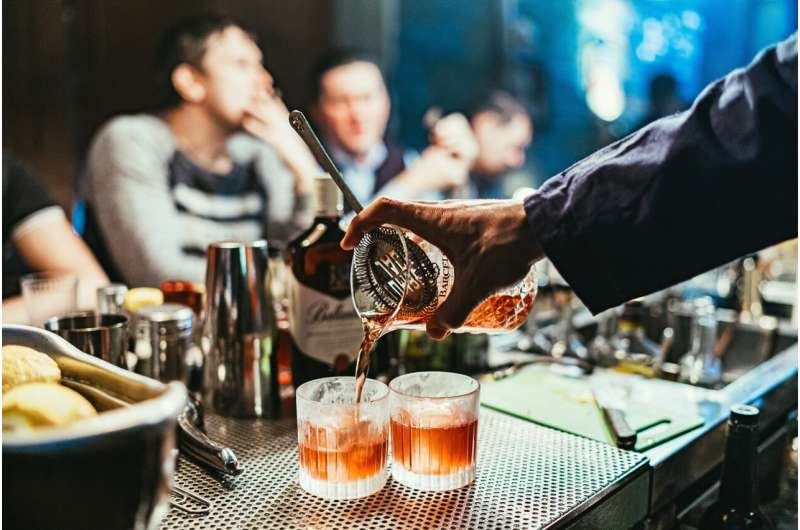This article has been reviewed according to Science X's editorial process and policies. Editors have highlighted the following attributes while ensuring the content's credibility:
fact-checked
peer-reviewed publication
trusted source
proofread
Study finds restaurants, bars still serving alcohol to intoxicated patrons

Nearly every state has laws that ban restaurants and bars from serving alcohol to visibly intoxicated customers. But, at least in one region, few establishments seem to be complying, according to a new study in the Journal of Studies on Alcohol and Drugs.
Researchers found that across 300 bars and restaurants in the San Francisco Bay area, staff only rarely made the right call when confronted with a clearly intoxicated person ordering alcohol: Just 21% of establishments refused service.
Fortunately, in this case, the customers were actually "pseudo-patrons" working with the researchers and pretending to be inebriated. But the implications are still disquieting.
"It's discouraging to think that these laws have had so little effect," said Robert Saltz, Ph.D., a senior scientist with the Prevention Research Center at Pacific Institute for Research & Evaluation, in Berkeley, Calif.
In all U.S. states except two (Florida and Nevada), it's illegal to serve alcohol to obviously intoxicated customers. But one challenge has been putting the laws into action. Some studies have found that training servers in responsible beverage service can help. Yet not all states require such training, Saltz said, and even when they do, the quality of that training may vary widely.
It's an important issue, Saltz said, because if the laws on the books were enforced, that could potentially prevent a lot of harm. Almost one-third of traffic accidents in the United States are alcohol-related, and research has found that drivers coming home from bars are often involved.
For their study, Saltz and his colleagues wanted to see not only whether establishments would serve alcohol to "drunk" pseudo-patrons but also whether any factors made that more or less likely: Would a busy, noisy bar be less likely to refuse service than a quieter restaurant, for example?
Over the course of a year, eight young adults trained for the study visited 300 bars and restaurants. They worked in pairs, with one portraying behaviors typical of an intoxicated patron and the other serving as an observer who recorded specific details.
Overall, servers only rarely refused to serve the pseudo-patron, although they were more likely to say no to women than to men: 31% of female patrons were refused versus 8% of men. The only other factor that seemed to correlate with refusals was whether the establishment was "upscale." Almost one third of fine-dining restaurants refused service—still clearly a disappointing rate, Saltz pointed out.
There is no single solution to the problem. More and better training for servers would likely help but will likely not be enough on its own, Saltz said. Some combination of laws, training, police enforcement and community awareness may be needed to move the needle, the researchers say.
More information: Saltz, R., Paschall, M. J., O'Hara, S., Buller, D. B., Woodall, W. G., & Martinez, L. (2024). Serving alcohol to an "obviously intoxicated" patron. Journal of Studies on Alcohol and Drugs, 85(2), 168–174. doi.org/10.15288/jsad.23-00253
















